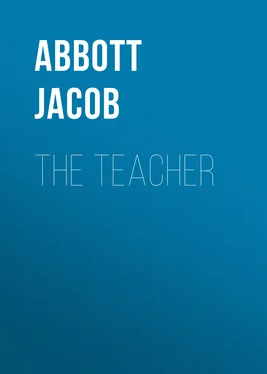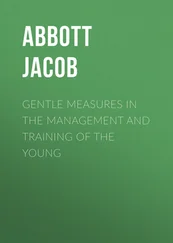Jacob Abbott - The Teacher
Здесь есть возможность читать онлайн «Jacob Abbott - The Teacher» — ознакомительный отрывок электронной книги совершенно бесплатно, а после прочтения отрывка купить полную версию. В некоторых случаях можно слушать аудио, скачать через торрент в формате fb2 и присутствует краткое содержание. Жанр: foreign_edu, pedagogy_book, на английском языке. Описание произведения, (предисловие) а так же отзывы посетителей доступны на портале библиотеки ЛибКат.
- Название:The Teacher
- Автор:
- Жанр:
- Год:неизвестен
- ISBN:нет данных
- Рейтинг книги:5 / 5. Голосов: 1
-
Избранное:Добавить в избранное
- Отзывы:
-
Ваша оценка:
- 100
- 1
- 2
- 3
- 4
- 5
The Teacher: краткое содержание, описание и аннотация
Предлагаем к чтению аннотацию, описание, краткое содержание или предисловие (зависит от того, что написал сам автор книги «The Teacher»). Если вы не нашли необходимую информацию о книге — напишите в комментариях, мы постараемся отыскать её.
The Teacher — читать онлайн ознакомительный отрывок
Ниже представлен текст книги, разбитый по страницам. Система сохранения места последней прочитанной страницы, позволяет с удобством читать онлайн бесплатно книгу «The Teacher», без необходимости каждый раз заново искать на чём Вы остановились. Поставьте закладку, и сможете в любой момент перейти на страницу, на которой закончили чтение.
Интервал:
Закладка:
These principles show how teaching may, in some cases, be a delightful employment, while in others, its tasteless dulness is interrupted by nothing but its perplexities and cares. The school-room is in reality, a little empire of mind. If the one who presides in it, sees it in its true light; studies the nature and tendency of the minds which he has to control; adapts his plans and his measures to the laws of human nature, and endeavors to accomplish his purposes for them, not by mere labor and force, but by ingenuity and enterprise; he will take pleasure in administering his little government. He will watch, with care and interest, the operation of the moral and intellectual causes which he sets in operation; and find, as he accomplishes his various objects with increasing facility and power, that he will derive a greater and greater pleasure from his work.
Now when a teacher thus looks upon his school as a field in which he is to exercise skill and ingenuity and enterprise; when he studies the laws of human nature, and the character of those minds upon which he has to act; when he explores deliberately the nature of the field which he has to cultivate, and of the objects which he wishes to accomplish; and applies means, judiciously and skilfully adapted to the object; he must necessarily take a strong interest in his work. But when, on the other hand, he goes to his employment, only to perform a certain regular round of daily work, undertaking nothing, and anticipating nothing but this dull and unchangeable routine; and when he looks upon his pupils merely as passive objects of his labors, whom he is to treat with simple indifference while they obey his commands, and to whom he is only to apply reproaches and punishment when they disobey; such a teacher never can take pleasure in the school. Weariness and dulness must reign in both master and scholars, when things, as he imagines, are going right; and mutual anger and crimination, when they go wrong.
Scholars never can be instructed by the power of any dull mechanical routine; nor can they be governed by the blind, naked strength of the master; such means must fail of the accomplishment of the purposes designed, and consequently the teacher who tries such a course must have constantly upon his mind the discouraging, disheartening burden of unsuccessful and almost useless labor. He is continually uneasy, dissatisfied and filled with anxious cares; and sources of vexation and perplexity continually arise. He attempts to remove evils by waging against them a useless and most vexatious warfare of threatening and punishment; and he is trying continually to drive , when he might know that neither the intellect nor the heart are capable of being driven.
I will simply state one case, to illustrate what I mean by the difference between blind force, and active ingenuity and enterprise, in the management of school. I once knew the teacher of a school, who made it his custom to have writing attended to in the afternoon. The boys were accustomed to take their places, at the appointed hour, and each one would stick up his pen in the front of his desk for the teacher to pass around and mend them. The teacher would accordingly pass around, mending the pens from desk to desk, thus enabling the boys, in succession, to begin their task. Of course each boy before he came to his desk was necessarily idle, and, almost necessarily, in mischief. Day after day the teacher went through this regular routine. He sauntered slowly and listlessly through the aisles, and among the benches of the room, wherever he saw the signal of a pen. He paid of course very little attention to the writing, now and then reproving, with an impatient tone, some extraordinary instance of carelessness, or leaving his work to suppress some rising disorder. Ordinarily, however, he seemed to be lost in vacancy of thought,—dreaming perhaps of other scenes, or inwardly repining at the eternal monotony and tedium of a teacher's life. His boys took no interest in their work, and of course made no progress. They were sometimes unnecessarily idle, and sometimes mischievous, but never usefully or pleasantly employed; for the whole hour was past before the pens could all be brought down. Wasted time, blotted books, and fretted tempers, were all the results which the system produced.
The same teacher afterwards acted on a very different principle. He looked over the field and said to himself, what are the objects I wish to accomplish in this writing exercise, and how can I best accomplish them? I wish to obtain the greatest possible amount of industrious and careful practice in writing. The first thing evidently is, to save the wasted time. He accordingly made preparation for mending the pens at a previous hour, so that all should be ready, at the appointed time, to commence the work together. This could be done quite as conveniently when the boys were engaged in studying, by requesting them to put out their pens at an appointed and previous time. He sat at his table, and the pens of a whole bench were brought to him, and, after being carefully mended, were returned, to be in readiness for the writing hour. Thus the first difficulty, the loss of time, was obviated.
"I must make them industrious while they write," was his next thought. After thinking of a variety of methods, he determined to try the following. He required all to begin together at the top of the page and write the same line, in a hand of the same size. They were all required to begin together, he himself beginning at the same time, and writing about as fast as he thought they ought to write, in order to secure the highest improvement. When he had finished his line, he ascertained how many had preceded him, and how many were behind. He requested the first to write slower, and the others faster, and by this means, after a few trials, he secured uniform, regular, systematic and industrious employment, throughout the school. Probably there were, at first, difficulties in the operation of the plan, which he had to devise ways and means to surmount: but what I mean to present particularly to the reader is, that he was interested in his experiments . While sitting in his desk, giving his command to begin line after line, and noticing the unbroken silence, and attention, and interest, which prevailed, (for each boy was interested to see how nearly with the master he could finish his work,) while presiding over such a scene, he must have been interested. He must have been pleased with the exercise of his almost military command, and to witness how effectually order and industry, and excited and pleased attention, had taken the place of listless idleness and mutual dissatisfaction.
After a few days, he appointed one of the older and more judicious scholars, to give the word for beginning and ending the lines, and he sat surveying the scene, or walking from desk to desk, noticing faults, and considering what plans he could form for securing, more and more fully, the end he had in view. He found that the great object of interest and attention among the boys was, to come out right, and that less pains were taken with the formation of the letters, than there ought to be, to secure the most rapid improvement.
But how shall he secure greater pains? By stern commands and threats? By going from desk to desk, scolding one, rapping the knuckles of another, and holding up to ridicule a third, making examples of such individuals as may chance to attract his special attention? No; he has learned that he is operating upon a little empire of mind, and that he is not to endeavor to drive them as a man drives a herd, by mere peremptory command or half angry blows. He must study the nature of the effect he is to produce, and of the materials upon which he is to work, and adopt, after mature deliberation, a plan to accomplish his purpose, founded upon the principles which ought always to regulate the action of mind upon mind, and adapted to produce the intellectual effect , which he wishes to accomplish.
Читать дальшеИнтервал:
Закладка:
Похожие книги на «The Teacher»
Представляем Вашему вниманию похожие книги на «The Teacher» списком для выбора. Мы отобрали схожую по названию и смыслу литературу в надежде предоставить читателям больше вариантов отыскать новые, интересные, ещё непрочитанные произведения.
Обсуждение, отзывы о книге «The Teacher» и просто собственные мнения читателей. Оставьте ваши комментарии, напишите, что Вы думаете о произведении, его смысле или главных героях. Укажите что конкретно понравилось, а что нет, и почему Вы так считаете.












